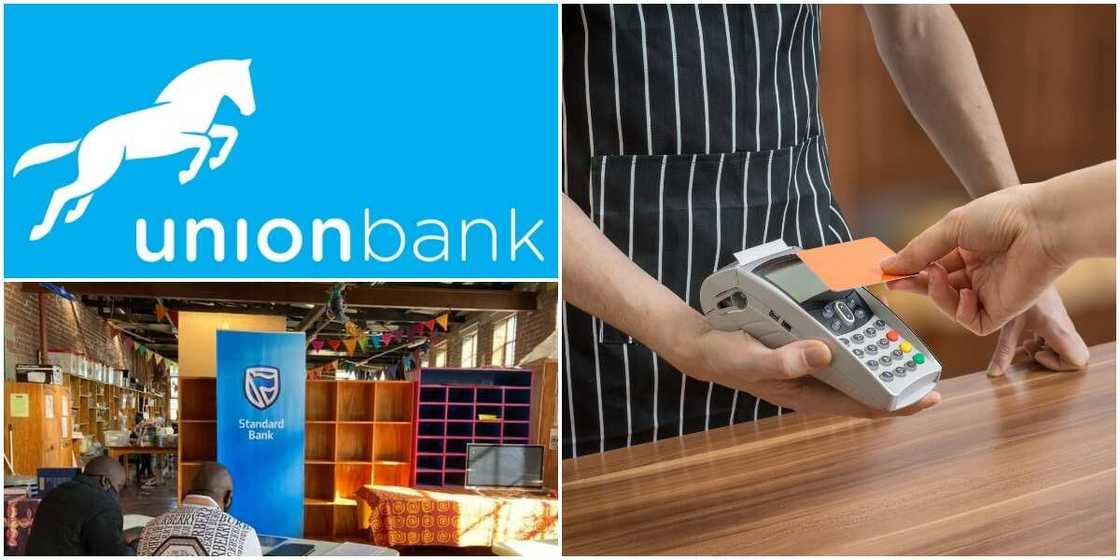POS Boom: The New Banking That Caused Union Bank to Close Branches, Standard Bank to Stop Building
- POS transactions is the new banking format in the financial sector in Nigeria, as banks redirect investment into the less costly venture
- Commercial lenders like Union Bank had closed some branches in Nigeria, while Standard Bank of Nigeria stopped building more physical halls
- Tech startups have also benefited from the agent banking system introduced by the Central Bank of Nigeria to increase financial inclusion
PAY ATTENTION: Click “See First” under the “Following” tab to see Legit.ng News on your Facebook News Feed!
The first time Adejoke Oluwatobi came in contact with a point of sale (POS) merchant was in the second half of 2012, six months after the Central Bank of Nigeria (CBN) launched the agent banking.
Oluwatobi had just arrived in Lagos, Nigeria's commercial hub, where the POS operation was kickoff. He first thought it was a merchant kiosk for telecoms company, as the network providers were the first to deploy such idea in streets and roadsides.
As she sighted the kiosk from afar, Oluwatobi approached to buy airtime, but as the undergraduate got closer, reality started dawning on her, and the words inscribed on the plank store became clearer - POS available.

Source: UGC
The agent told Oluwatobi upon enquiry:
PAY ATTENTION: Subscribe to Digital Talk newsletter to receive must-know business stories and succeed BIG!
"We don't sell card here".
It was a shocker for her to hear that she can withdraw and deposit cash outside bank premises without having to use the Automated Teller Machine (ATM).
POS: The new banking system
Oluwatobi's discovery has grown to become an essential part of the Nigerian banking system, and its going nowhere, if the numbers the agents have been recording in recent years are to go by.
While the merchant business is dying a slow death in the telecommunications industry where it started due to advancements in technology that now enables telcos to digitally sell airtime to customers, Legit.ng findings showed that the idea that is now fading among the telecoms, has become a goldmine in the banking sector.

Read also
Globacom at 18: Celebrating the groundbreaking impacts of Nigeria’s fastest-growing telecom company
POS terminals is now being used as alternative to banking halls, and as banks double down on their penetrate rate, they have slowed establishment of branches, and instead positioned banking agents in overserved and underserved areas in Nigeria.
The goal is to ensure that there's a mobile banking agent, either directly-owned or through third-party, across the nooks and crannies of the country.
Data from the Nigeria Inter-Bank Settlement System (NIBSS) shows about 307,000 PoS machines are in circulation across the country as of March 2021, with 167,000 reported active.
While the number of POS terminals are below CBN's 440,000 target for 2015, banks are increasing their focus on the agent banking to milk it for all it's worth.
In August 2019, Union Bank said it has received regulatory approval to close some branches, in order to focus on agent banking business and other digital enabled channels.
"These more convenient banking channels will result in decreased dependence on some of our physical bank branches. In line with this, we have received regulatory approvals to close down some of our branches as we continue to expand our digital."

Read also
Four Nigerian Agric Tech startups and founders who changed farming business, empower over 500,000 smallholder farmers
The next month, Standard Chartered announced that it will no longer open branches across Nigeria - this is despite having limited physical walk-in halls in the country; 22 branches in Lagos, Abuja and Port Harcourt.
Chief Executive Officer of Standard Chartered Bank of Nigeria and West Africa, Lamin Manjang, said investment will henceforth, since 2019, be directed to digital banking.
Part of Manjang statement reads:
"We believe that the future of retail banking would largely dovetail towards the digital channels. Quite honestly, if you look back at 30-40 years ago and the role of the traditional bank branch and then look at the role of a branch today, you will realise that it is quite different.
“So, the things that would typically take you to a bank branch are things that you can now do without visiting a branch."
This new investment focus by banks will further hamper the growth of banks to customer ratio in Nigeria, which is put at 4.3 branches per 100,000 customers.
POS is the new cash cow for banks
As the CBN limit the charging rate of ATM withdrawals, banks have been looking for other revenue opportunities, and they found it in POS business.
In December 2019, the apex bank said for every electronic transfers below N5,000, bank customers will pay N10, while N5,000 to N50,000 electronic transfer will incur charges of N25.
This implementation of charge wasn't enough for banks as the CBN had cut down ATM charge to N35 after the third withdrawal within one month.
Now most ATM terminals in banks are either without cash or with network service to process withdrawals or other transactions - Gabriel Alabi, a social media manager and website designer, believes it is an attempt by banks to force their customers to make use of POS terminals, as users pay N100 for every N5000 withdrawal, compared to ATM's N35 for third transaction.
During the thick of the COVID-19 pandemic and lockdown in Nigeria, PoS transactions surged by 859%, according to Shared Agent Network Expansion Facilities (SANEF).
Here's the shock, according to Statista, between 2015 to 2019, a boom was recorded in POS payments, which rose to 438.6 million from 34 million, between the five year period.
Also, over 655 million POS transactions, valued at N4.7 trillion, was made in 2020, by Nigerian merchants and mobile money operators (MMOs), according to NIBSS.
Tech startups are also milking from afar
While banks have been squeezing profit out of the point of sales business, tech startups have also been taking their own share, as a mobile money operator.
Interswitch, Quickteller and TeamApt, are some of the tech enabled companies playing in the field with Banks. The most recent, is OPay, which fully focused on payment in 2020 after the Lagos State Government banned bike-hailing services.
OPay's entry into the system has been groundbreaking, as the company's growth within two years pushed its market valuation to above $2 billion.
The Nigerian-based startup partnered with POS operator to gain access to the market front, and this has allowed it process mobile money operators' 80% bank transfers in Nigeria.
The Chinese-owned firm also reportedly process 20% of Nigeria's non-merchant point of sales transactions. It was gathered that OPay makes above $3 billion monthly transaction volumes.
The first to enter this space is Paga. The co-founder, Tayo Oviosu, once stated that every minute, 12 Nigerians get their payment problems solved using Paga.
The company has over 27, 273 agents' accounts, with over 17.91 million - Paga is also heading towards over $1 billion in market valuation.
POS boom: What's in it for Nigerians?
Job creation
The Managing Director of Ecobank Nigeria, Patrick Akinwuntan, had once stated that the company was able to employ 6000 agents, an act it cannot do for its banking hall.
This employment drive has brought banking services closer to Nigerian communities that are underbanked, as the country has 4.3 branches per 100,000 customers - this has transformed the rural areas lacking bank services.
The profit in the POS venture between the merchants and banks is N99.25 for the operator and N0.75 for the financial institution, however, the agents bear the N50 stamp duty cost placed on every POS transactions by the CBN.
Legit.ng understands that profit is made when customers make lesser withdrawals like N2,000 in five transactions, than N10,000 in one - this means for the latter, N500 will be made, while the large transaction will only attract N200.
A POS operator, who simply identify him as Chukwuebube, said the lesser transactions earn him more. Chukwuebube said location also matter, as more customers mean more transactions - He said the business is profit for him, that's why he has more than three POS points.
Another POS merchant, who identified herself as Adejumo Atunrase, being a banking agent has its benefit. While she was tight-lipped on the volume of daily transactions, Atunrase confirmed the profitability of the business.
Atunrase said with ATM's constantly down in her area in Ogba, residents in ths area have no choice but to come withdraw from her, and with limited competition around her, she earns big time.
Easy access to bank services
POS operators or banking agent have been able to decentralise the banking system, increasing the financial inclusion rate of the regulator, CBN, while also paying commission.
This is why banks no longer have to spend heavily on physical structures in rural areas, when they can just station one or two agents in a community, and earn more on transactions than it will do on walk-in or ATM services.
The rise in POS operation have also put a stop on the venture of banks situating their ATM terminals at locations far from their premises just to connect with their customers.
How eNaira Will Work: CBN Gives Latest Update to Know About Nigeria's Digital Currency
The central bank is trying to introduce a new innovation into the financial system of Nigeria with the proposed launch of eNaira, Nigeria's digital currency.
The CBN intends to use the eNaira to replace the non-regulated cryptocurrency which has become popular among Nigerians, but remains banned in the country.
It was gathered that the government-backed digital currency is a non-interest bearing asset, so Nigerians can't use it to hedge devaluation.
Source: Legit.ng








